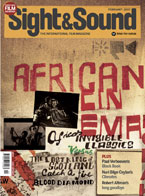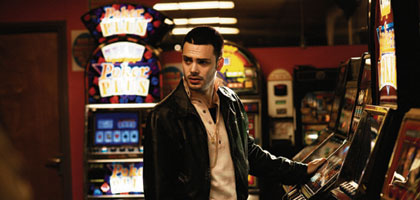Primary navigation

UK 2005

Reviewed by Michael Brooke
Our synopses give away the plot in full, including surprise twists.
Green Lanes, north London, the present. Mr Karva runs a local gangland empire. His stepson Othello hangs around with his hairdresser girlfriend Tina (who performs sexual favours for Karva on the side) and his friends Emilio and Roadrunner, the local all-purpose errand boy. One night, Roadrunner finds an abandoned child in a park and smuggles him into Othello's flat. While the others try to decide what to do with him, Roadrunner announces that the child is an angel and that he will no longer work for Karva. Strange events start to occur: Roadrunner is tortured by Karva's henchmen but their blowtorch stops working at a crucial moment; Othello finds that he can no longer lose at gambling (bankrupting Karva's bookies in the process); kebab-shop owner Christella believes that a shambling drunk is the baby son she abandoned; and Tina shows signs of rediscovering her Catholic faith. All this is observed by Father Daniel, the local priest, with bemusement and concern, though he too finds himself succumbing to his innermost desires and performing as a transvestite club singer. Karva asks Emilio to kidnap the child for him. Emilio does so, but finds himself compelled to attack Karva in his Turkish bath and threaten Othello with a gun, demanding that he hand over Tina. In a final confrontation with Othello, Tina and Karva, Emilio shoots the child in the head, and then himself. The others' lives return to normal.
Directorial debuts, at least those showing genuine talent, commonly have two flavours: tightly focused calling-card and over-ambitious sprawl. Current British releases London to Brighton and The Lives of the Saints represent each to perfection. A magical-realist fable set in north London, this first feature by celebrity photographer Rankin and film-making partner Chris Cottam attempts an eccentric (bordering on demented) blend of the sickly-sweet whimsy of Carol Reed's A Kid for Two Farthings (albeit transplanted from the now-defunct East End Jewish community to Haringey's multi-ethnic Green Lanes), graphic torture sequences out of a Saw sequel, and a narrative arc resembling W.W. Jacobs' short story ‘The Monkey's Paw', in which wishes come true with unforeseen and potentially fatal consequences.
If all this weren't heady enough, the film is also liberally laced with more Catholic imagery than anything in British cinema since Ken Russell's heyday, and Lives of the Saints is as wildly self-indulgent, tonally choppy and floridly scripted as anything in his oeuvre. But it's also genuinely heartfelt, with the script by regular Terry Gilliam collaborator Tony Grisoni putting such unfashionable issues as spiritual loneliness centre stage.
The film starts with errand-boy Roadrunner (Daon Broni) doing his rounds, thus introducing both the locale and the principal characters before he makes the discovery that gives the plot its motor: an abandoned child, curly-haired and mute, with caricature cherubic features visible even under a thick layer of grime. The child, a boy who is never even nicknamed, has supernatural powers, and has a life-changing effect on those he encounters. These seemingly miraculous changes are not always welcome, however: for one character, guaranteed success at gambling destroys all the fun; for another, a yearning for a long-lost child turns up a shuffling tramp; and one man's desire to let it all hang out in a gay club leads to a vicious queerbashing. This is one of many scenes sitting uneasily alongside the airy fantasy; another shows Roadrunner threatened with a blowtorch by henchmen sent by his boss, Mr Karva, whose empire encompasses bookies to pool halls to Turkish baths. Played by an unrecognisably shaven-headed James Cosmo with a presence as demonstrative as his voluminous beard, Karva steals every scene he's in, though not necessarily to their advantage. Given his penchant for doing exactly what he wants when he wants, his ultimate desire to become a child again seems somewhat redundant.
His stepson Othello (David Leon) is more intriguing. Like his namesake, he is eaten up with envy, but of others' wealth and success - though when he achieves both himself, he realises he's lost more than he's gained. His voice of reason is girlfriend Tina (Emma Pierson), who is nevertheless pragmatic enough to recognise the strategic value of providing sexual favours for Karva. The odd one out is Emilio (Bronson Webb), Othello's rat-faced sidekick, the paucity of whose ambition is betrayed when he kidnaps the child, only to find his murderous desires no longer restrained by natural hesitancy. The bloody climax is absurdly overwrought, but it logically ties up the film's various themes: Tina, who has rediscovered her faith, is even allowed a brief pietà as she cradles a corpse.
The film-makers' visual pedigree ensures a distinctive look, achieved through hand-held, multi-speed camerawork, often in the same sequence. Roadrunner's errands are interspersed with sudden explosions of colour, frequently achieved via quick cutaways to close-ups of passing local detail. Exteriors are smothered under a powder-blue duvet of low-lying cloud, with suburban trains running across the bottom of the frame, their sulphurous yellow lights dragging the eye downwards. As with Wong Kar-Wai's impressionistic views of Hong Kong, the effect is both disorienting and intoxicating - or, to invoke Rankin's past as a magazine publisher, dazing and confusing.